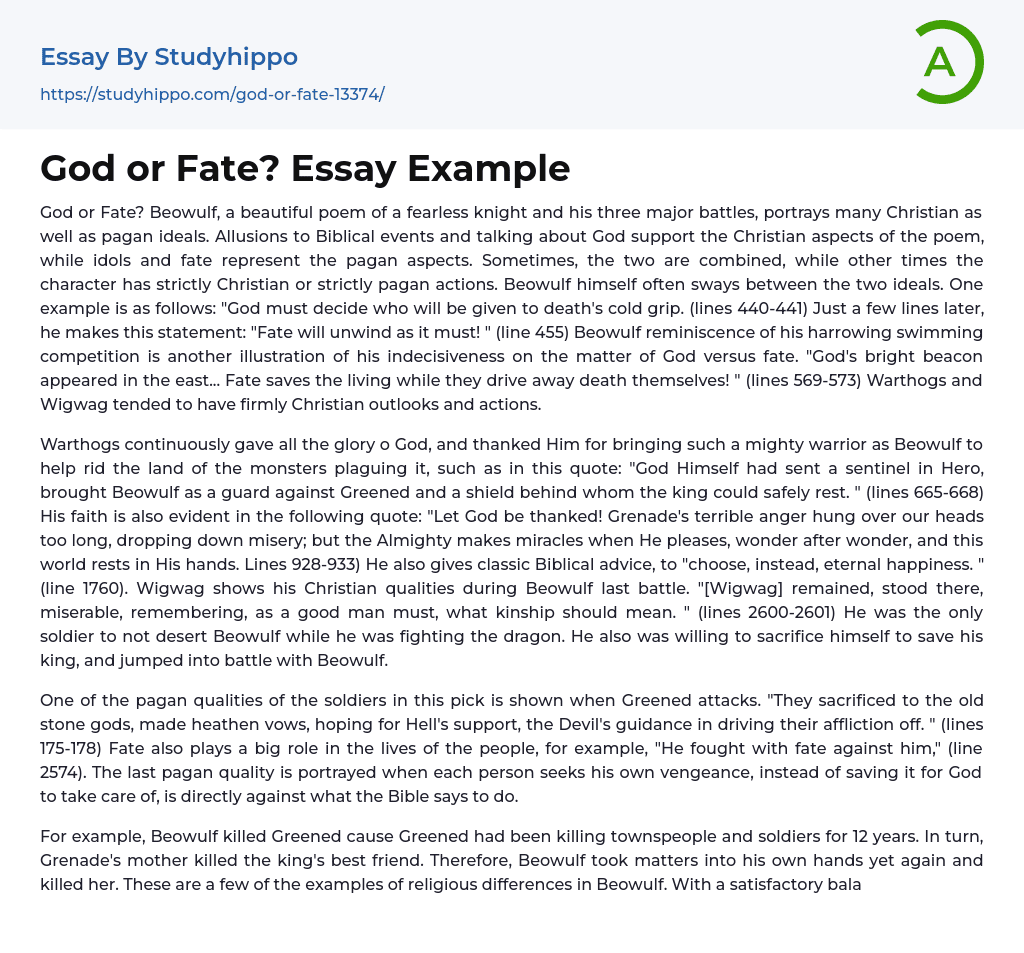The poem Beowulf reflects both Christian and pagan ideals. It includes references to Biblical events and mentions God to highlight its Christian elements, while also featuring idols and fate to represent pagan beliefs. The protagonist, Beowulf, embodies a mix of these ideals, sometimes expressing strictly Christian or strictly pagan actions. For instance, he states that God must determine who will die, but also acknowledges that fate will play its role. In his recollection of a swimming competition, Beowulf shows uncertainty regarding the roles of God and fate, mentioning both as factors in saving the living from death's grasp. On the other hand, characters like Warthogs and Wigwag adopt a strongly Christian perspective, praising and thanking God for sending Beowulf as a protector against the land's monsters. Warthogs continuously expresses gratitude towards God, acknowledging His role in overcoming misery br
...ought by Greened's anger.
Although the Almighty performs miracles at His will, demonstrating wonder after wonder, and holds this world within His grasp (Lines 928-933), He also imparts timeless Biblical counsel to "select eternal happiness" (Line 1760). Wigwag exemplifies his Christian attributes during Beowulf's final battle, as he remains steadfastly by his side, marked by sorrow and recollection, as any virtuous man would, acknowledging the significance of kinship (Lines 2600-2601). Notably, Wigwag manifests his loyalty by refusing to abandon Beowulf while he confronts the dragon. Additionally, he exhibits a willingness to sacrifice himself for his king, fearlessly joining Beowulf in the fray (Lines 2601).
The pagan characteristics of the soldiers in this narrative are unveiled when Greened launches an assault. They engage in rituals dedicated to the ancient stone gods and make pagan oaths, seeking support
from Hell and the Devil's guidance in repelling their afflictions (Lines 175-178). Fate also assumes a significant role in the lives of these individuals, for instance, "He fought with fate against him" (Line 2574). Lastly, another pagan attribute is revealed when individuals take matters into their own hands to seek vengeance, disregarding the biblical instruction to leave retribution to God.
A notable example is when Beowulf kills Greened due to his twelve-year campaign of murdering townspeople and soldiers. In response, Greened's mother slays the king's closest companion. Consequently, Beowulf assumes personal responsibility once again by dispatching her. These instances exemplify a few of the religious disparities present in Beowulf.This poem demonstrates the literary prowess of the ancient Britons by effectively appealing to both pagan and Christian audiences with a harmonious depiction of good and evil.
- John Locke essays
- 9/11 essays
- A Good Teacher essays
- A Healthy Diet essays
- A Modest Proposal essays
- A&P essays
- Academic Achievement essays
- Achievement essays
- Achieving goals essays
- Admission essays
- Advantages And Disadvantages Of Internet essays
- Alcoholic drinks essays
- Ammonia essays
- Analytical essays
- Ancient Olympic Games essays
- APA essays
- Arabian Peninsula essays
- Argument essays
- Argumentative essays
- Art essays
- Atlantic Ocean essays
- Auto-ethnography essays
- Autobiography essays
- Ballad essays
- Batman essays
- Binge Eating essays
- Black Power Movement essays
- Blogger essays
- Body Mass Index essays
- Book I Want a Wife essays
- Boycott essays
- Breastfeeding essays
- Bulimia Nervosa essays
- Business essays
- Business Process essays
- Canterbury essays
- Carbonate essays
- Catalina de Erauso essays
- Cause and Effect essays
- Cesar Chavez essays
- Character Analysis essays
- Chemical Compound essays
- Chemical Element essays
- Chemical Substance essays
- Cherokee essays
- Cherry essays
- Childhood Obesity essays
- Chlorine essays
- Classification essays
- Cognitive Science essays




